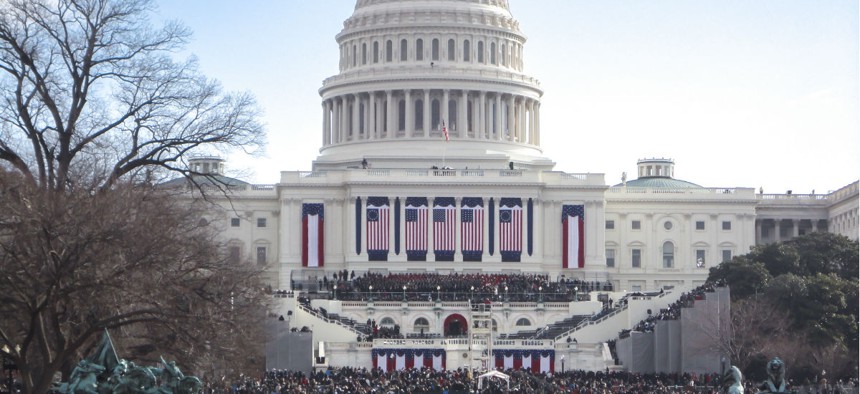Open-Government Groups Seek Tighter Transition Ethics Policies
Obama’s 2008 code that included lobbyist ban cited as model.
Two days after the Donald Trump called for a ban on federal workers’ post-government lobbying, a coalition of transparency and campaign finance activists wrote to both presidential campaigns seeking a commitment to ethics by their transition teams that includes a ban on lobbyists joining government.
“Members of both parties agree it is of paramount importance that the public believe their leaders make decisions solely to advance the public interest,” said the Oct. 19 letter signed by 16 nonprofit groups such as Demand Progress, the Project on Government Oversight, the Campaign Legal Center, Democracy 21 and the Sunlight Foundation, along with individuals such as American Enterprise Institute scholar Norman Ornstein. “A key aspect of ethical governance is hiring the right staff and making sure your expectations for their behavior [are] clear.”
The groups reproduced the 2008 Code of Ethical Conduct used by the 2008 Obama-Biden transition project, but then recommended that it be expanded between now and Inauguration Day to minimize “conflicts arising from financial interests and direct advocacy (lobbying).” The letter also recommended naming a senior person in the transition to be responsible for ethics.
Specifically, the groups said the code should broaden to “to include financial compensation or significant closely held assets—such as securities or stock options—as financial conflicts of interest that would preclude individuals from involvement in a particular matter.” Resolution of apparent conflicts would be made by the transition project executive director.
The restrictions on hiring executives straight from the lobbying profession—an idea President-elect Obama was criticized for, and to which the current Clinton campaign has yet to commit—would “refocus the Obama-era prohibitions arising from the Lobbying Disclosure Act to include persons who engage in direct advocacy or direct or supervise those who do,” the letter said. “The Obama administration’s ban on federally registered lobbyists led even some supporters of that measure to conclude that it excluded some worthy individuals from service while allowing others to serve who were not deserving,” the letter noted.
Hence, “All persons who engage in more than a de minimis amount of paid direct advocacy, defined as lobbying activities under Lobbying Disclosure Act, [would be] prohibited from working on any matter on which they lobbied. This changes the current rule, which applies only to federal registered lobbyists who spent 20 percent of their time lobbying.”
In a look ahead to the new administration, the groups also recommended that the transition identify a senior official as the point person for ethics. “This person’s primary duty [would be] ensuring an ethical transition, including enforcement of this code and addressing conflicts of interest and other ethical matters, such as… principles for transparency and accountability,” the letter stated. “He or she should lay the groundwork for the incoming administration’s senior official for good government, modeled in part after the Obama administration’s ethics czar.”








